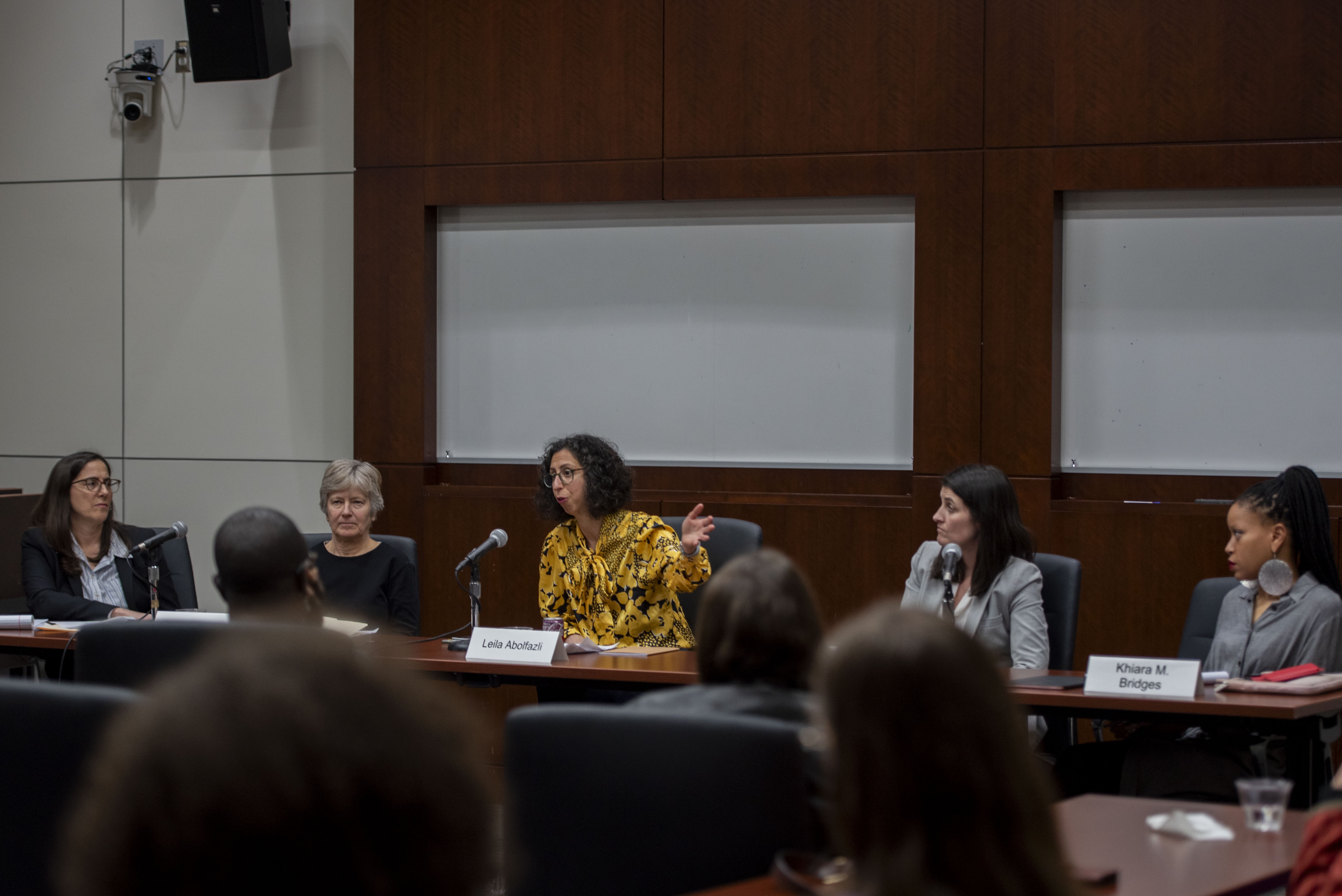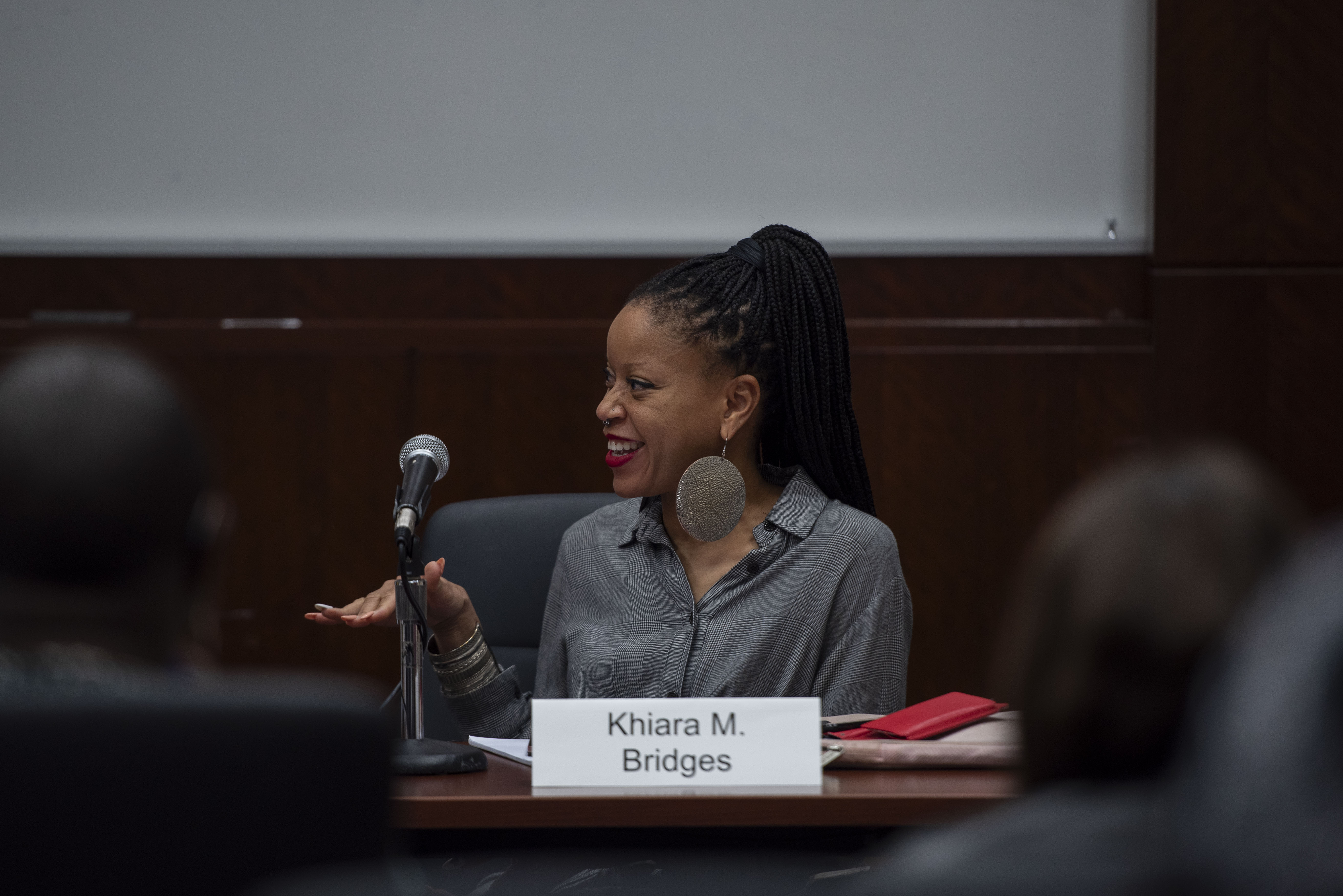A panel of legal experts warned that recent federal executive orders threaten reproductive and gender rights during a UCLA School of Law event March 6.
The panel – hosted by the UCLA Law Center on Reproductive Health, Law, and Policy, in partnership with Yale Law School’s Program for the Study of Reproductive Justice and Temple University Beasley School of Law – discussed issues in the growing fight for gender and reproductive justice under the new Trump administration. CRHLP Legal and Policy Director Diana Kasdan moderated the panel.
Kasdan said that current legal struggles stem from both recent executive orders and the 2022 Dobbs v. Jackson Women’s Health Organization ruling, which overturned Roe v. Wade and eliminated the federal constitutional right to abortion.
Kasdan added that the Supreme Court decision fueled rollbacks on reproductive rights impacting women, pregnant individuals and transgender people.

Speakers discuss reproductive justice during March 6 event at the UCLA School of Law. (Jeannie Kim/Daily Bruin senior staff)
Mary Bonauto, the senior director of civil rights and legal strategies at GLBTQ Legal Advocates and Defenders, outlined several executive orders that restrict passport gender markers, housing for incarcerated transgender people, military service, K-12 policies on gender identity and access to gender-affirming healthcare for minors.
She said on the panel that one recent executive order, titled “Defending Women From Gender Ideology Extremism And Restoring Biological Truth To The Federal Government,” defines sex at conception, which could impact federal and state law and deny protections to transgender people.
Bonauto added that Trump’s executive orders must operate within existing laws.
“There’s statutes, there’s regulations from agencies, there are judicial opinions and they all bear on how one receives these executive orders,” she said.
Leila Abolfazli, senior director of National Abortion Strategy at the National Women’s Law Center, said on the panel that lawmakers are using the same legal strategies that once restricted abortion rights to target transgender people.
Abolfazli added that she believes these efforts go beyond impacting young transgender people and actively attempt to reverse society to a time when rights were largely reserved for men. She added that the new policies have intensified long-held conversations about equality.
“We are reclaiming some discussions and narratives but adding in a 2025 flavor,” Abolfazli said. “Will we make it through this dark period where democracy is being attacked at every corner? I’m not sure.”
Karli Eisenberg, a supervising deputy attorney general of the California Attorney General’s Office for Healthcare Rights and Access, said on the panel that the state is prepared to ensure that California remains a “reproductive justice state” despite federal pushbacks.
The office responded to the 2022 overturning of Roe v. Wade by sponsoring privacy laws like Assembly Bill 1242 and 352, which protect abortion and gender-affirming data, she added. The office has also trained law enforcement on these protections and litigated cases that threatened reproductive rights, she said.
Eisenberg said California took similar steps at the start of the Trump administration in response to Project 2025, a right-wing policy paper. For instance, California enhanced penalties for injuring or interfering with people who try to access reproductive health facilities in response to the rollback of a similar federal act, she said.
“It is absolutely true that when the federal government steps out of its role, the state can and will step in, and especially when you have someone like AG (Attorney General Rob) Bonta, who is very dedicated to this issue,” she said.
Khiara M. Bridges, a UC Berkeley School of Law professor, said on the panel that the current assault on equality rights is unsurprising. Conservative legal efforts have long targeted protections beyond abortion, she added, including the Voting Rights Act and race-based affirmative action.
Bridges said these rollbacks create an opportunity to overturn landmark cases protecting equality rights and advance long-standing policy goals.
“What we are witnessing is a fully expected assault on all the things that they have hated for at least two generations,” she said.

Khiara M. Bridges, a UC Berkeley School of Law professor, speaks at a March 6 event focused on reproductive justice at the UCLA School of Law. (Jeannie Kim/Daily Bruin senior staff)
Kasdan also highlighted the importance of public advocacy in light of government inaction during the panel. An immediate public response can often arrive at change faster than litigation, she added.
Evan Bernick, an associate professor at the Northern Illinois University College of Law who attended the event, said he found the panel inspiring, especially since he got to hear from legal experts he had studied for years.
Tarj Patel, a second-year law student and extern at the UCLA Law CRHLP, said she appreciated hearing scholars discuss the current political landscape. She added that the discussion reinforced the importance of grassroots advocacy and staying informed in advancing reproductive and gender justice.
“It made me realize that it’s a team effort, if anything,” she said. “One person is not going to be able to do all the work.”
Bonauto said after the panel that young people hold significant power in shaping policy.
“To actually hear a young person size up the issue and frame things up is really important,” she said. “Young people have a lot of power they don’t realize.”